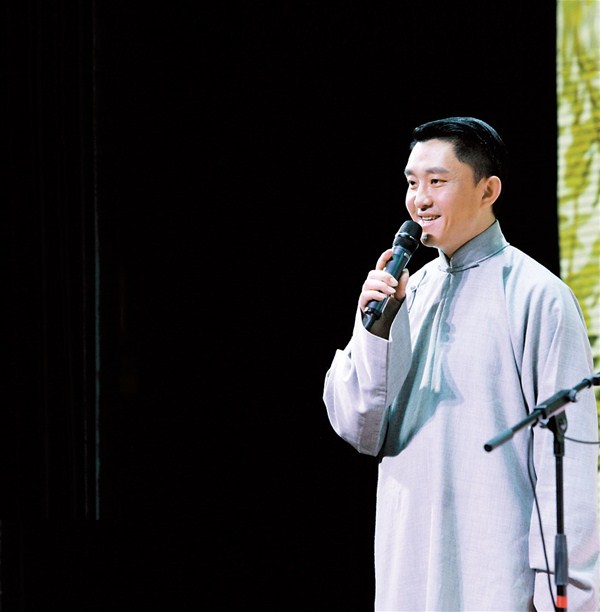
今日上海
高博文演绎评弹爵士混搭 - 2017年10月13日
Adding some razzle and jazz to pingtan

WHEN Gao Bowen first attended a training class launched by the Shanghai Pingtan Troupe as a ninth grader, there were 10 students. Within a few years, however, he was the only one left.
Gao, 47, has loved pingtan, a narrative musical tradition born in Suzhou and dating back to the Song Dynasty (960-1279), since he was a kid and listened to it on radio every day. In 1984, he bought a ticket to watch the first pingtan performance in his life. He even pretended playing pipa, a four-stringed plucked instrument, with broom when he saw artists on TV.
Gao will return to the stage of Shanghai World Music Festival during the National Day holiday with more surprises.
“Because we are performing outdoors, we will choose the music accordingly,” says Gao. “If it is as slow as usual, the audience may get bored.
“But I don’t worry about foreign audience or young people not having an ear for music of this kind. That’s the beauty of music. Do we need to understand Italian to enjoy opera? Not necessarily,” he explains.
In order to attend an audition with the Shanghai Pingtan Troupe, Gao says he even stole money from his parents’ drawer for the entrance fee when he was 16. He was one of only 10 chosen from the 200 applicants.
But he had second thoughts after he saw his peers slowly switching to other career paths. “I seriously considered becoming a DJ and having a certificate that allowed me to perform,” Gao says.
But he finally stayed on thanks to the government’s effort in and support for preserving traditional culture.
However, Gao says he doesn’t expect pingtan to become an integral part of people’s life again.
“It will never be popular or mainstream again,” he notes. “Frankly, pingtan got that popular mainly because there were not much entertainment options back then. Can we make it popular again? Certainly not. But so long as there is a niche market and it will be passed down, I’m content.”
For Gao, the main problem for pingtan survival is fading interest. When he was doing promotion on campuses, he found that young people could hardly relate to classical works. So he tried to spark their interest by doing comparison, for example, between people falling in love in ancient and modern times.
Unlike some conservative traditional artists, Gao is all for bringing pingtan into the 21st century. He has added jazz and rock elements into the slow tunes of pingtan and proven that music really has no boundaries.
Gao feels the essence of pingtan lies in the wisdom of life passed down from generations.
“Anyone can learn to play pipa or sanxian (a three-stringed fretless plucked instrument). And everyone living in Suzhou can speak the local dialect,” he says. “These don’t make pingtan special. But the wisdom in the stories is precious.
“My former students didn’t understand the deep meaning behind when they were learning it, but as they grew older and gathered more experiences, they told me that pingtan has taught them useful life lessons, like when to keep a low profile and when to stand up.”

